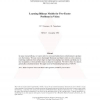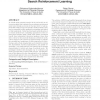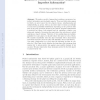312 search results - page 45 / 63 » Learning Partially Observable Deterministic Action Models |
100
click to vote
CVPR
1997
IEEE
15 years 6 months ago
1997
IEEE
In many vision problems, we want to infer two (or more) hidden factors which interact to produce our observations. We may want to disentangle illuminant and object colors in color...
139
click to vote
IJCAI
2001
15 years 3 months ago
2001
R-max is a very simple model-based reinforcement learning algorithm which can attain near-optimal average reward in polynomial time. In R-max, the agent always maintains a complet...
115
click to vote
ATAL
2009
Springer
15 years 9 months ago
2009
Springer
In several agent-oriented scenarios in the real world, an autonomous agent that is situated in an unknown environment must learn through a process of trial and error to take actio...
107
click to vote
ICALP
2009
Springer
15 years 9 months ago
2009
Springer
Abstract. We study a model of games that combines concurrency, imperfect information and stochastic aspects. Those are finite states games in which, at each round, the two players...
121
click to vote
ATAL
2007
Springer
15 years 8 months ago
2007
Springer
A problem of planning for cooperative teams under uncertainty is a crucial one in multiagent systems. Decentralized partially observable Markov decision processes (DECPOMDPs) prov...



